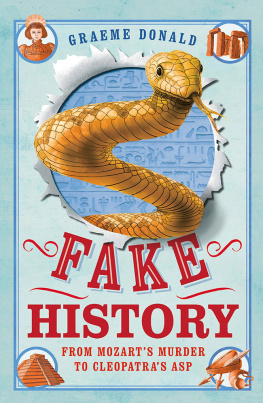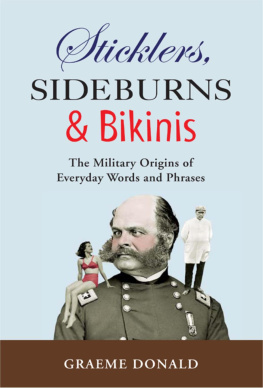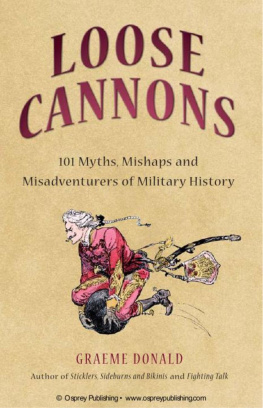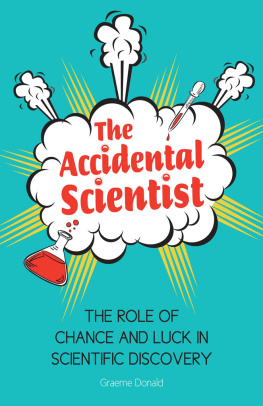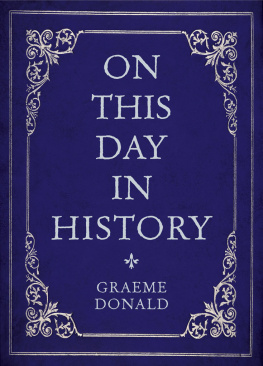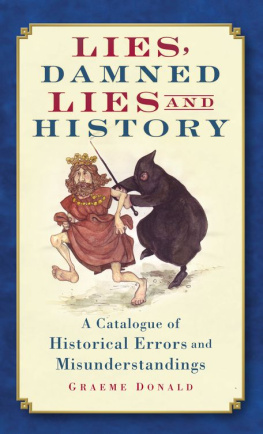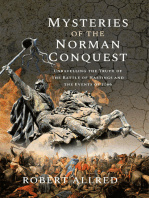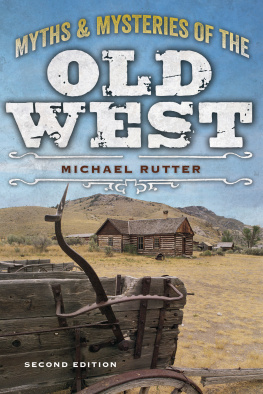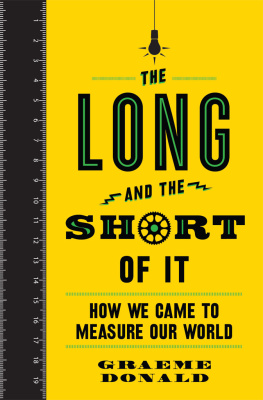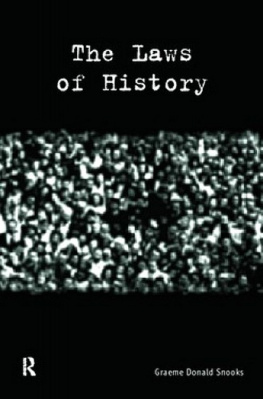Graeme Donald - The Mysteries of History: Unravelling the Truth From the Myths of Our Past
Here you can read online Graeme Donald - The Mysteries of History: Unravelling the Truth From the Myths of Our Past full text of the book (entire story) in english for free. Download pdf and epub, get meaning, cover and reviews about this ebook. year: 2018, publisher: MikeOMara, genre: Non-fiction. Description of the work, (preface) as well as reviews are available. Best literature library LitArk.com created for fans of good reading and offers a wide selection of genres:
Romance novel
Science fiction
Adventure
Detective
Science
History
Home and family
Prose
Art
Politics
Computer
Non-fiction
Religion
Business
Children
Humor
Choose a favorite category and find really read worthwhile books. Enjoy immersion in the world of imagination, feel the emotions of the characters or learn something new for yourself, make an fascinating discovery.
- Book:The Mysteries of History: Unravelling the Truth From the Myths of Our Past
- Author:
- Publisher:MikeOMara
- Genre:
- Year:2018
- Rating:5 / 5
- Favourites:Add to favourites
- Your mark:
- 100
- 1
- 2
- 3
- 4
- 5
The Mysteries of History: Unravelling the Truth From the Myths of Our Past: summary, description and annotation
We offer to read an annotation, description, summary or preface (depends on what the author of the book "The Mysteries of History: Unravelling the Truth From the Myths of Our Past" wrote himself). If you haven't found the necessary information about the book — write in the comments, we will try to find it.
The Mysteries of History: Unravelling the Truth From the Myths of Our Past — read online for free the complete book (whole text) full work
Below is the text of the book, divided by pages. System saving the place of the last page read, allows you to conveniently read the book "The Mysteries of History: Unravelling the Truth From the Myths of Our Past" online for free, without having to search again every time where you left off. Put a bookmark, and you can go to the page where you finished reading at any time.
Font size:
Interval:
Bookmark:


Also by the same author
When the Earth Was Flat
On This Day in History
The Accidental Scientist
The Long and the Short of It

This paperback edition published in 2021
First published as The Mysteries of History in Great Britain in 2018 by
Michael OMara Books Limited
9 Lion Yard
Tremadoc Road
London SW4 7NQ
Copyright Michael OMara Books Limited 2018, 2021
All rights reserved. You may not copy, store, distribute, transmit, reproduce or otherwise make available this publication (or any part of it) in any form, or by any means (electronic, digital, optical, mechanical, photocopying, recording or otherwise), without the prior written permission of the publisher. Any person who does any unauthorized act in relation to this publication may be liable to criminal prosecution and civil claims for damages.
A CIP catalogue record for this book is available from the British Library.
ISBN: 978-1-78929-362-3 in paperback print format
ISBN: 978-1-78243-969-1 in ebook format
For Rhona she knows why!
Contents

V OLTAIRE ONCE DISMISSED historians as nothing more than gossips who tease the dead, glorify the inglorious and vilify those who are worthy but unpopular with whoever is paying for the history books to be written.
And to a certain extent he was right. There are major events from history that are still presented today as a maze of conflicting disinformation and biased opinion that leave the modern reader trying to navigate their way to the truth through a rather confusing fog. When it comes to a re-examination of the reputations of prominent characters from our past, some emerge from closer scrutiny stripped of their veneer of nobility, while others, previously thought unworthy, emerge significantly less tarnished.
The biased rewriting of history includes the almost criminal fiasco that was the Charge of the Light Brigade, which had to be rebranded as a shimmering example of the unquestioning heroism of the average British soldier in order to save face, and the seemingly monstrous Dr Crippen, who was railroaded to the gallows by a young forensic scientist determined to make a name for himself. Or the real story of Elizabeth Bthory, the woman dubbed Countess Dracula, who was far from the terrifying character she was made out to be, but rather a victim of her enormous wealth.
When writing this book, the greatest care has been taken to avoid the pitfalls of relying on biased sources so, no matter how eminent the writer of any one particular source, all dates and information have been cross-checked against others of both sympathetic and opposing opinion. That said, should any reader find an error, I would be very happy to make the correction.
Graeme Donald

M ANY ACCOUNTS OF Joan of Arc portray her as a heroine of the early fifteenth century. They tell of her leading the French armies to countless victories over the English invaders and their Burgundian allies before she was captured and burned as a witch in the marketplace of Rouen. But in fact, among other things, it seems she wasnt French, she never commanded any army or even fought in battle, and she was not executed for witchcraft. So how did such inaccuracies build to create this iconic character?
She was born in 1412 at Domrmy in Lorraine, an independent duchy not assimilated into France until 1766. Her father was Jacques Darce, his name variously presenting as Darx, Darc and even Tarce but not dArc, as the apostrophe was never used in fifteenth-century French names and there was no such place as Arc from which he could have hailed. Her mother was Isabelle de Vouthon, and both she and Jacques elected to be known by the surname of Rome, though it is unclear which of them, if either, had undertaken the pilgrimage to Rome to qualify for such usage. Their daughter was christened Jehannette, not Jeanne/Joan, and it was not until the nineteenth century that the epithet Jeanne dArc or Joan of Arc appeared through a misreading of Darc; during her alleged lifetime she was referred to as La Pucelle, The Maid. The Romes were not of simple peasant stock; Jacques was a highly successful farmer and leading citizen who allegedly threatened to strangle her [Jehannette] with my own hands if she goes into France. From that, if nothing else, we may safely assume that the people of Domrmy considered themselves to be anything but French.
Much that is told of Jehannette comes from chronicles discovered in Notre Dame in the nineteenth century, but not everyone is convinced that these documents are genuine. According to Roger Caratini, regarded by some to be one of Frances most prestigious historians:
Im very much afraid that precious little of what we French have been taught in school about Joan of Arc is true She was, it seems, almost entirely the creation of Frances desperate need for a patriotic mascot in the nineteenth century. The country wanted a hero, the myths of the revolution were altogether too bloody, and France more or less invented the story of its patron saint. The reality is, sadly, a little different Joan of Arc played no role, or at best only a very minor one, in the Hundred Years War. She was not the liberator of Orlans for the simple reason that the city was never besieged. And the English had nothing to do with her death. Im afraid it was the Inquisition and the University of Paris that tried and sentenced her Im afraid the fact of the matter is that we were the ones who killed our national hero. We may have a problem with the English, but as far as Joans concerned, we really shouldnt.
IMAGINARY VOICES
Little interest was shown in the shadowy figure of Joan even in France until Napoleon decided to resurrect her as a cult figure. But if she really did lead her sub-commanders to such stunning victories in the Hundred Years War, where are all the glowing testimonies from them? All we really have is a vague tale of a young woman who heard voices and saw things. She is said to have claimed that her two main voices were those of St Margaret of Antioch and St Catherine of Alexandria and while in her time the reality of these two was accepted, it has since been established beyond the doubt of even the most fervent hagiophile that neither in fact existed. This leaves us with a likely fictitious heroine allegedly guided by the voices of two other women who did not exist. But none of this prevented her from being canonized in 1920.
Caratini is by no means alone in thinking Joan a nineteenth-century invention or, at best, one of many maids who followed the army, carrying a banner on the same daily pay as an archer. France at the time was in turmoil. Assisted by their allies, the Burgundians, the English were in control of vast swathes of the country, resulting in the French court relocating to the safety of Chinon in the Loire. If the entire legend is to be accepted at face value, then we are required to believe that an uneducated sixteen-year-old farm girl, who could barely write her own name, simply rode down to Chinon and, having unerringly picked out the Dauphin who was hiding among his own courtiers to test her, told him of her voices and repeated a few prophecies before sauntering out as a battle commander. Even if the Dauphin had been daft enough to make such an appointment, is it realistic to believe that the battle-hardened troops assigned to her banner would have meekly followed, given that she knew nothing of tactics and weaponry?
Font size:
Interval:
Bookmark:
Similar books «The Mysteries of History: Unravelling the Truth From the Myths of Our Past»
Look at similar books to The Mysteries of History: Unravelling the Truth From the Myths of Our Past. We have selected literature similar in name and meaning in the hope of providing readers with more options to find new, interesting, not yet read works.
Discussion, reviews of the book The Mysteries of History: Unravelling the Truth From the Myths of Our Past and just readers' own opinions. Leave your comments, write what you think about the work, its meaning or the main characters. Specify what exactly you liked and what you didn't like, and why you think so.

